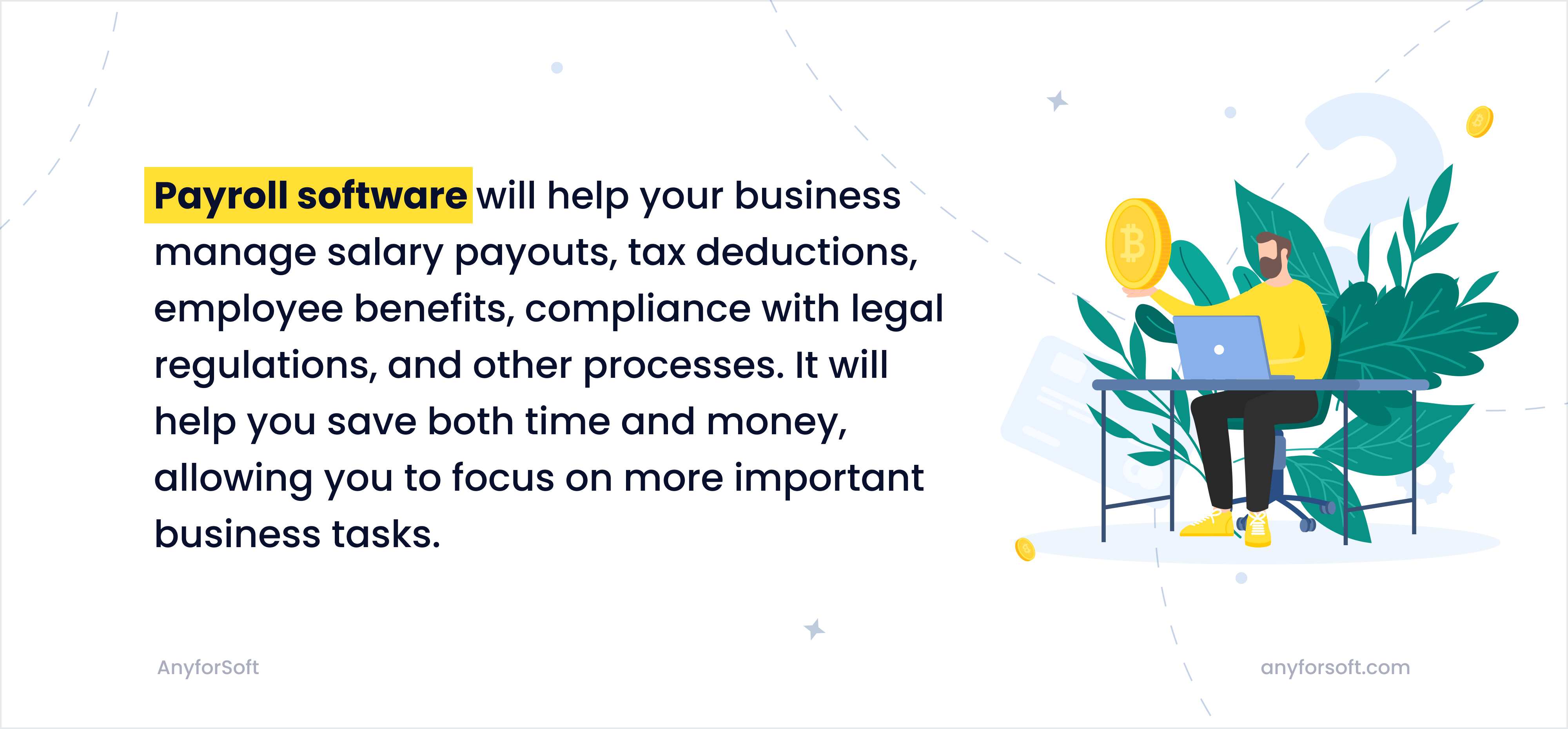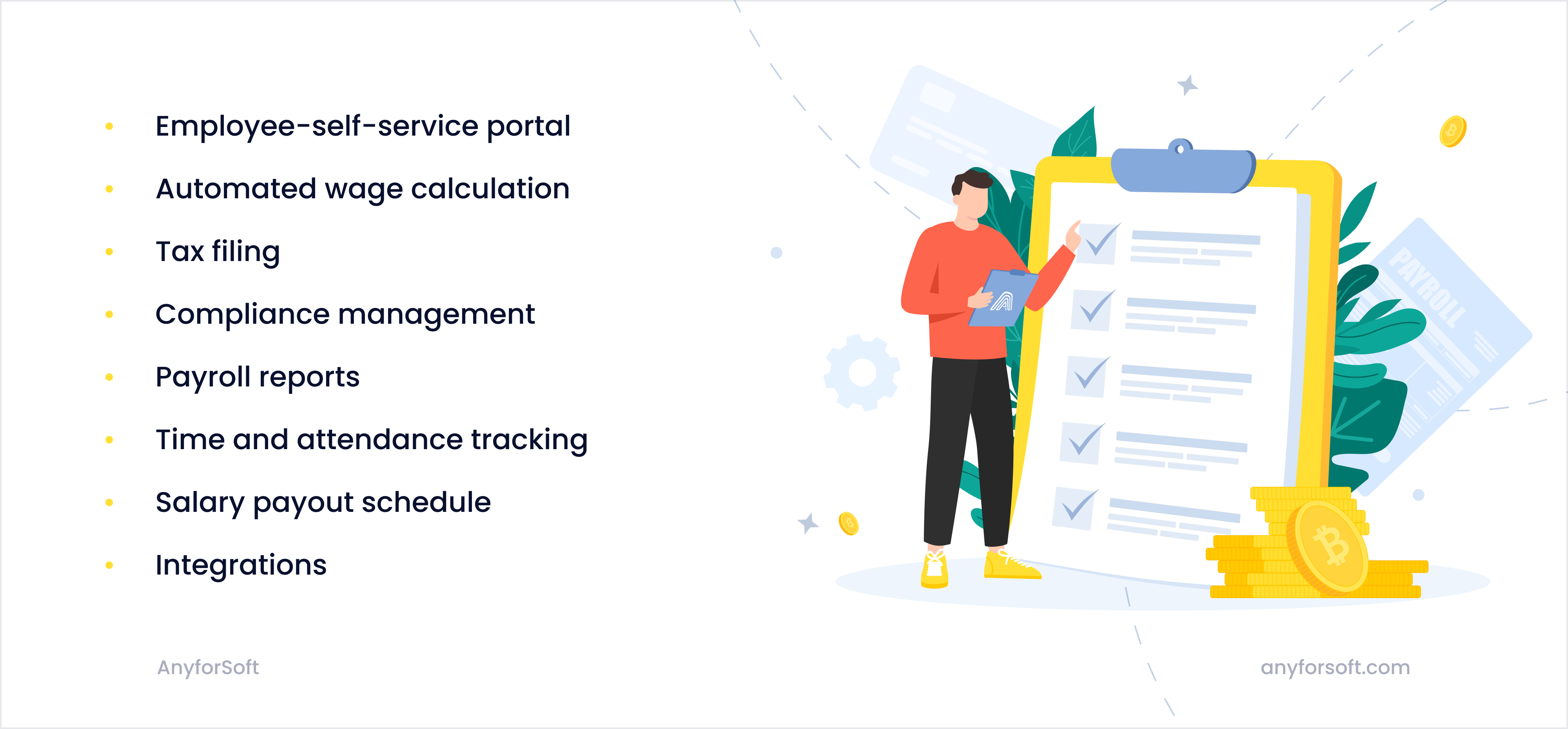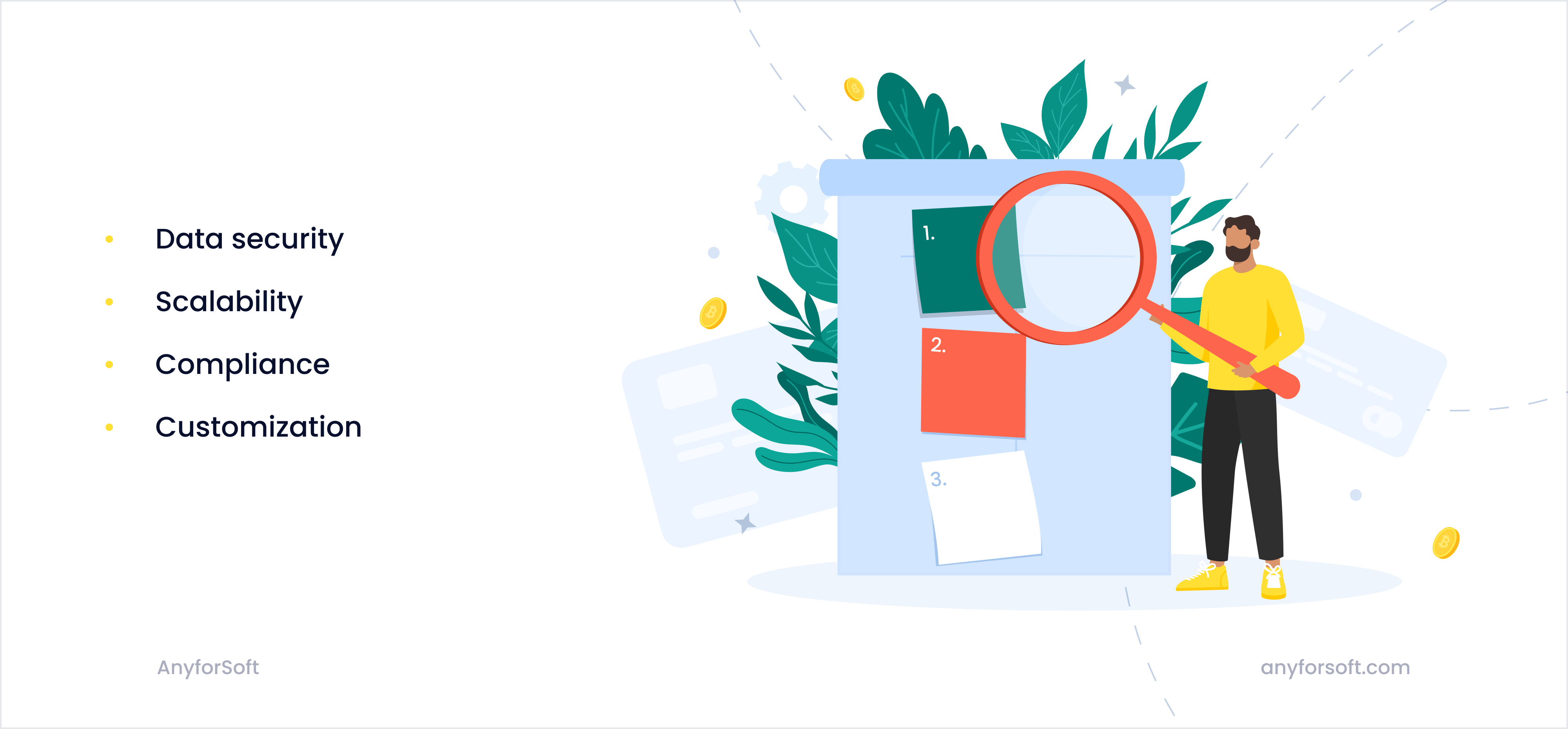Payroll processing is a tedious and time-consuming task. And the bigger your company gets, the harder it becomes to manage all payroll operations without mistakes.
If you’re reading this, you probably have issues in that regard. Perhaps, you rely on multiple payroll systems that don’t work very well together, creating a mess. Or maybe you’re using an old off-the-shelf solution that you’ve long overgrown. As a result, you’re making constant payroll errors and spending too much valuable time processing the data instead of handling more important business tasks.
Sounds familiar?
If so, your organization will definitely benefit from payroll system development.
Custom payroll automation software will help you accurately calculate wages, make statutory deductions, ensure that your company is compliant with the laws and regulations in your country, and much more.
As a company that specializes in fintech development services, AnyforSoft would like to discuss multiple aspects of payroll management software. In the following paragraphs, you will learn:
- Why you should invest in payroll software development
- How such tools help businesses
- What features you should create for your payroll management solution
- What things you should prioritize in the development process
Without further ado, let’s get started!
Why invest in an automated payroll system?
Let’s start with defining what payroll processing software is. Payroll software is a solution that helps businesses manage various accounting and human resources activities related to their employees—salary payouts, tax deductions, employee benefits, compliance with legal regulations, and so on. A thought-out tool will save two of your organization’s most important resources: time and money. It will take up to 70% of repetitive rule-based tasks, freeing up your time for more important tasks.

To illustrate how you can benefit from a payroll system, let’s explore the benefits that such software brings to businesses:
- Time efficiency for your HR staff. By automating payroll calculation and financial data entry processes, your HR staff will be able to save plenty of time for important tasks instead of repeating routine operations.
- Accuracy. Tacking payroll in an Excel spreadsheet with all the work hours, overtime, sick leaves, and other employee information leaves room for errors. In fact, 33% of businesses make payroll mistakes every year (according to IRS). If you were to develop payroll software, you would eliminate errors associated with the human factor, ensuring that your employees are paid the right amount and on time. That would lead to higher morale and trust in the workplace.
- Transparency of operations. Payroll processing solutions can be integrated with the finance and accounting solutions you use, providing full transparency of your operations. You will be able to track payroll processes and correct inaccuracies made over the course of payroll execution. That will help you stay on budget and better plan for the future.
- Legal compliance. Payroll systems are created with laws and government regulations in your country in mind. Moreover, they can automatically update whenever a local, state, or federal employment law changes. For instance, when tax laws in your country change, your software will apply the new rules when deducting tax payments from employee salaries. That way, you will ensure that your organization stays compliant with the latest laws, which will save you from legal issues and ensuing fines.
As you can see, a quality payroll solution can benefit your organization in multiple ways and streamline its processes. However, to maximize its advantages, you should carefully plan out the software’s features.
Key features of payroll software solutions
How to develop a payroll system that complements your company’s processes and workflows? The answer: you should carefully plan out the software’s functionality. Here are the key features used in off-the-shelf and custom payroll solutions:

Let’s discuss each feature in more detail.
Employee-self-service portal
Your employees should have an employee-self-service portal where they can:
- Track hours worked and overtime
- Submit leave requests
- Download regulatory forms
- Check details of their pay scale, benefits, and advances
That way your organization will be as transparent as possible, increasing your employee trust and loyalty.
Automated wage calculation
Payroll systems should be able to automatically generate paychecks and stubs based on payroll data:
- Salary payment schedules
- Attendance and leave
- Hours of overtime work
- Bonuses
- Commissions
- Pay raises
- Wage deductions
- Taxes
While you’re a small company, calculating wages manually doesn’t seem like an issue. However, as you scale and hire new employees, you’re bound to make mistakes in the payroll process. To avoid them, develop the automated wage calculation feature.
Tax filing
Nobody enjoys dealing with tax forms and tax filing activities. The requirements constantly change and all the intricacies of state and federal taxes are quite hard to understand.
Luckily, a payroll solution can automate manual processes associated with tax filing. Namely, it can pre-fill the documents for you and send them out. Moreover, the software automatically updates as tax laws in your country change, saving you from potential mistakes.
Even though your team will probably have to sign the arrangements, your system will notify you whenever it’s time to file, helping you avoid penalties for missing a deadline.
Compliance management
Laws and regulations change all the time. To ensure that your software can reflect these changes, you should design it with compliance management features in mind. That way, when there is a change in local, state, or federal employment law, your software will be able to update its rules and take them into account when processing payroll data.
Payroll reports
With custom payroll management software, you will be able to generate payroll reports automatically instead of spending hours on manual work.
Time and attendance tracking
For any company that pays hourly wages, it is critical to track the time and attendance of its employees. A payroll solution will monitor sick leaves, hours worked, overtime, downtime, and other factors, using this data to process payroll accordingly.
Salary payout schedule
Your employees should know when their pay period comes and how often it is paid: weekly, bi-weekly, or monthly. They should also be able to view their salary for a selected period and access annual statements to be able to evaluate their current financial status.
Integrations
Your payroll system will likely be integrated with other custom or ready-made software solutions that you use. Before building a payroll management system, think of the integrations you want to make. That will help the development team build your application architecture accordingly.
That’s all we had to say regarding features. Now let’s discuss another critical aspect of payroll software development—priorities.
Payroll system development priorities
To create a quality payroll system for your organization, you must prioritize the following things:

- Data security. Payroll systems deal with sensitive information, including your employees’ names, personal details, addresses, social security numbers, bank account info, and payroll data. To avoid cyber threats and leaks of data, you need to implement various protection measures. You can learn more about potential threats in the fintech industry and how to eliminate them in our recent article on fintech cybersecurity.
- Scalability. No matter how big your company is right now, you should always create software with scaling in mind. If possible, avoid monolithic architecture and implement microservices architecture instead. That way, when the time to scale comes, you will able to scale individual services without affecting the others, which will save you from the hassle of refactoring the entire code.
- Compliance. Your payroll solution must comply with the laws and regulations in the countries where your company operates. Your team must do research in that regard before creating a tool.
- Customization. Your business needs may change over time. Considering this, you should build software that could reflect these changes. In other words, design a payroll system to be customizable and flexible.
Now you know how to develop payroll that fully meets your requirements!
Wrapping up
Developing payroll management software is costly, but it provides a myriad of benefits in the long run. By investing in a financial management tool, you will be able to:
- Automate labor-intensive tasks, saving your time for more important matters.
- Avoid payroll processing errors, ensuring that your employees are paid the right amount and on time.
- Offer complete transparency regarding your company’s payroll operations, increasing the trust and loyalty of employees.
- Ensure the organization’s compliance with the latest government regulations and laws in the countries in which you operate.
We believe that a quality payroll system will quickly pay off and enable you to save money and time.
So don’t hesitate—invest in payroll solution development today.
If you don’t have a team with enough expertise, you can always rely on AnyforSoft. We have over 12 years of development experience and 25% of our developers are senior-level specialists who are well versed in modern technologies, frameworks, and tools. We can create software of any complexity, from simple MVPs with basic features to sophisticated systems that support everything your organization requires.
Contact us today and let’s discuss your project!
